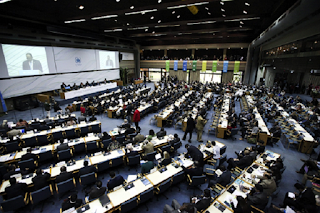World
leaders’ adoption of an internationally accepted goal on sustainable energy for
all is a key that unlocks progress across a stream of other priorities, from
ending poverty and hunger, through clean water, health and education, to gender
equality, job creation, economic growth and climate action.
Among the 17 Sustainable Development Goals (SDGs) adopted at
the UN Sustainable Development Summit on 25 September is goal number 7 which
seeks to “Ensure access to affordable, reliable, sustainable, and modern energy
for all.”
SDG 7’s targets on energy access, renewable energy and
energy efficiency are enshrined in the objectives of the UN Secretary-General’s
Sustainable Energy for All initiative (SE4All), which stands ready and able to
play a core role in implementing, tracking and reporting on the goal.
Some 1.1 billion people worldwide live without electricity,
and 2.9 billion people depend on smoky, dangerous traditional fuels such
firewood, charcoal and kerosene for cooking and providing light.
According to the World Bank, only 24 percent of the
population of sub-Saharan Africa has access to electricity, compared with 40
percent in other low income countries.
For Africa, energy poverty and poor energy access are
significant obstacles to development, with impact on individuals, families and
business opportunities.
At the same time, wasteful energy use, especially in
high-income countries, fuels potentially devastating climate change. Access to
energy is a human right which must be achieved for all to allow for equitable
development.
“For the first time, SDG 7 provides an internationally
accepted roadmap to sustainable energy for everybody, in the developed and
developing world alike,” said Rachel Kyte, who will take over next January as
Chief Executive Officer of SE4All.
PACJA Secretary General Mithika Mwenda adds that energy is a
key component in the mitigation response to combatting climate change.
“The African continent is facing a particularly key moment
in its development pathway, with a stark choice to be made between either
following the same high-carbon path pursued by industrialized countries, or
concentrating its growth on low-carbon climate resilient development pathway.
Africa must choose the latter both for the good of the planet and its own development.
An energy transformation is crucial to enable the continent to grow
sustainably,” he said.
More than 90 million people have already gained access to
sustainable energy under pledges made for the SE4All initiative, and
commitments to date can provide energy access for around a billion people by
2030, cutting energy poverty in half despite population growth.
SE4All’s Global Tracking Framework (GTF),
coordinated by the World Bank and the International Energy Agency and supported
by more than 20 other partner agencies, is ready to act as a rigorous tool for
tracking and reporting progress against the targets of SDG 7.
Mithika Mwenda adds that African governments must support
energy transformation by channeling resources toward renewable energy sources. Developed countries must also support Africa through providing resources
support renewables and enhancing capacity of developing countries in producing
clean energy.
Underlining its commitment to action towards SDG 7, SE4All held
two high-level events on the sidelines of the Sustainable Development Summit.






No comments:
Post a Comment